This Time Cameron Stumbled
Adelina Marini, December 14, 2011
 I remember a remark from the Matrix, for me fundamental for the entire philosophy of the movie. When Neo for the first time went to see the Oracle, they talked and then she told him: "And don't worry about the vase"! "What vase?", Neo asked, turning abruptly backwards, thus pushing a vase down, which broke. "That vase", the Oracle said. Neo was bewildered, as initially he did not believe that the Oracle really had those capabilities she was claimed to have and this was why he tried to ask how it was possible for her to know that he would push the vase. And here's the remark: "Oh, what will later bother you is whether had I not told you about the vase you would have still broken it".
I remember a remark from the Matrix, for me fundamental for the entire philosophy of the movie. When Neo for the first time went to see the Oracle, they talked and then she told him: "And don't worry about the vase"! "What vase?", Neo asked, turning abruptly backwards, thus pushing a vase down, which broke. "That vase", the Oracle said. Neo was bewildered, as initially he did not believe that the Oracle really had those capabilities she was claimed to have and this was why he tried to ask how it was possible for her to know that he would push the vase. And here's the remark: "Oh, what will later bother you is whether had I not told you about the vase you would have still broken it".
Now, imagine that David Cameron was in Neo's role when he appeared with specific expectations at the European Council on December 8-9 in Brussels. In the Oracle's role quite comfortably the leaders of France and Germany can fit. The vase? In general the scene with the Oracle in that movie evokes a lot of philosophical thoughts and this is why it would be quite simplistic to compare the vase with the EU, but for the purposes of comparison, yes, we can say that for Britain the EU is the vase. The vase, however, could also be the British national interest, as you will see below.
One Council - two unions
Quite worn out was the expectation that this summit too will be fateful, but for Britain it really proved to be fateful. The reason is that Cameron went to Brussels to hear what would the future of the EU be but was not ready for the breaking of the vase. As he himself explained at dawn on Friday, "if I couldn’t get adequate safeguards for Britain in a new European treaty, then I wouldn’t agree to it. What is on offer isn’t in Britain’s interests, so I didn’t agree to it".
What has been agreed on Friday, as euinside already wrote, is a new treaty to be made, mainly by the eurozone member states, but Bulgaria, the Czech Republic, Hungary, Denmark, Latvia, Lithuania, Poland, Romania and Sweden had always indicated that they might join. As is written in the joint statement of the eurozone after the summit "the objective remains to incorporate these provisions into the treaties of the Union as soon as possible".
The British national interest
The main British interest regarding the EU is the single market. Although, through the years of its membership in the European community Britain to have tried to stay both outside and inside and that played out its initial role, the globalisation processes in the last 20 years, and most of all the crisis of 2008, proved that half-way decisions sooner or later fight back. Britain is currently painfully feeling on its back the crisis in the euro area, because it is inevitable when you took part in consumption to bear the crisis too.
This strong national interest, as well as the other - related to protection of the London City from European regulation - was clearly stated by Prime Minster David Cameron before the summit. It has to be noted that the leader of the Conservatives and a premier for just less than two years indeed invested huge efforts to hammer out such a solution of the crisis in the eurozone that would both calm the financial markets down and be of Britain's interest. Against the backdrop of the constantly evolving opinions in the EU, most of all under the leadership of France and Germany, Cameron indeed did everything he could - two weeks before the fateful Council he met Angela Merkel and a 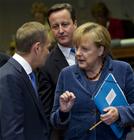 week later - French President Nicolas Sarkozy. The Merkel-Sarkozy tandem, however, came up with a specific vision about what has to be done to improve the situation of a constantly spreading crisis.
week later - French President Nicolas Sarkozy. The Merkel-Sarkozy tandem, however, came up with a specific vision about what has to be done to improve the situation of a constantly spreading crisis.
After them Cameron too laid out in details the British interests - literally a day before the Council. In an article for The Times he very clearly outlined what he wanted - changes in the treaties; if the eurozone would break-up - fine, but not if it would decide to use the existing structures of the EU; keeping the single market and protecting the financial centre in London from more European regulation. Up to the moment when he was forming this position of his, David Cameron hardly knew how would the debates unfold in the night of the 9th of December.
Cameron's big mistake is that from the very beginning of the crisis in the eurozone up until now and in spite of his entire euroscepticism, he was speaking of support for finding a solution to the problem, he was ready to help (in the case of Ireland he agreed to provide a bilateral loan), he participated very actively in the discussions at all levels and even managed (with Poland's help) to gain the eurozone summits not to take place in isolation but together with them meetings to be held of all 27 member states, so the countries outside the euro area instead of being just informed about what had been decided to be briefed about the decisions and not to be isolated from the debates there.
Against the backdrop of these efforts, stemming from the fact that Britain's economy is directly bound to that of the eurozone and the EU at large, the premier's decision from Friday seems like a turning of his back and an abrupt shift of direction. Now Britain not only will not be aware what direction the monetary union will take but it will not take part in its forming.
Britain is and will continue to be a member of the EU
This was David Cameron's firm conviction, expressed during two-hour debates in the British Parliament, that took place against the background of symptoms of a rift in the unity of the ruling coalition, consisting of Cameron's Conservatives and the junior partner - the liberal democrats of Nick Clegg. In an interview with the BBC Clegg said that Britain's decision from Friday in the long run was bad for the country, for the economy and for the perspective for jobs creation. The difference in opinion between the prime minister and his deputy, naturally, proved to be in the centre of public debates in the United Kingdom and quite logically focused a large part of the questions during the Prime Minster's Questions in Parliament on Monday (December 12).
According to Cameron, two were the options at the European Council: either a treaty of all 27 countries with proper safeguards for Britain. Or a separate treaty in which Eurozone countries and others would pool their sovereignty on an intergovernmental basis, with Britain maintaining its position in the Single Market, and in the European Union of 27 members. A lot of rumours started spreading about what exactly Britain asked for and even, as The Financial Times quoted a close to the summit European diplomat, while there were discussions about the saving of the euro the British asked for peanuts. It is not clear what they wanted, aside from the officially stated, but before the parliament Mr Cameron said: "We were not trying to create an unfair advantage for Britain. [...] We were not asking for a UK opt-out, special exemption or generalised emergency brake on financial services legislation".
In his words what he wanted was level playing field for open competition of financial services throughout the EU member states but with arrangements that every member state will be able to regulate itself its financial sector.
 A large part of the speakers from the opposition Labour party attacked the prime minister for the absence of his deputy Nick Clegg from the House. Later Clegg himself explained for Sky News that he wanted the questions for the premier to be in essence and not to focus on his differences with his deputy. In the attacks against Cameron took part the "heavy artillery" of the Labour party - pro-European politicians like Denis McShane, a former European affairs minister and Jack Straw, former foreign minister in the cabinets of Tony Blair.
A large part of the speakers from the opposition Labour party attacked the prime minister for the absence of his deputy Nick Clegg from the House. Later Clegg himself explained for Sky News that he wanted the questions for the premier to be in essence and not to focus on his differences with his deputy. In the attacks against Cameron took part the "heavy artillery" of the Labour party - pro-European politicians like Denis McShane, a former European affairs minister and Jack Straw, former foreign minister in the cabinets of Tony Blair.
Their main criticism was that with his decision David Cameron practically vacated Britain's seat at the table, where it is yet to be debated what direction the development of the European community would take. A seat that would have allowed the British society to take part actively in the formation of the common future. Or, as a British member of parliament said: "Now, Mr Prime Minister, you will be informed about the situation in the EU from the pages of The Financial Times". Cameron rejected all criticism by insisting that he took the right decision and that he protected his country's interest, the London City's as well, of which he recalled that it was a leading financial centre in the world, where 100,000 people were employed in Birmingham and another 150,000 in Scotland. A centre that supported the entire economy of Britain and even in Europe.
In the narrow party and national interest maybe the British prime minister is right that he had protected that national interest. The big question, however, is is this really, in the longer run, the national interest? David Cameron mentioned several times, trying to prove his case, that his current decision was no different than when it was decided some time in the past Britain to stay out of the eurozone. But it is different because the eurozone has been created not under pressure from outside but under pressure from the inside. Constructive and benign pressure. The journey, the beginning of which was put on Friday will be built under pressure from the outside - by the financial markets that expected an immediate solution. A journey, during which it is possible other countries to drop out from the race and finally only the toughest and best to remain. Those who think that in a globalised and a regionalising world stronger are communities not individuals. So, Mr Cameron, don't worry about the vase! Worry whether if you did not know that there was a vase, you would have kept it whole.
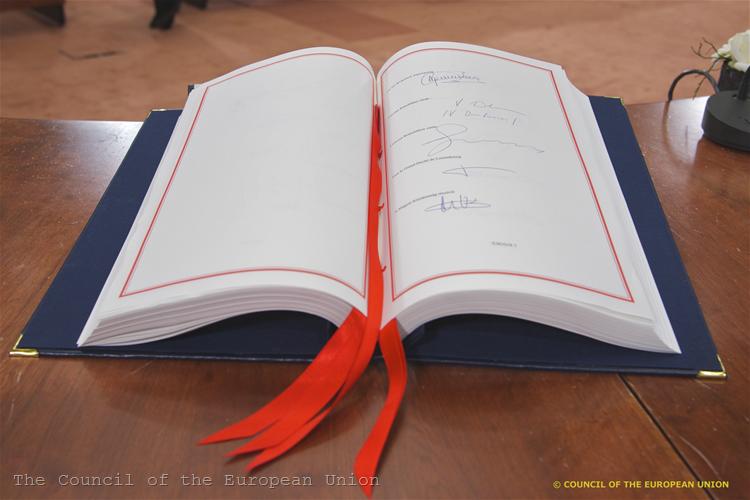 | © The Council of the European Union
| © The Council of the European Union Klaus Regling | © Council of the EU
Klaus Regling | © Council of the EU Mario Centeno | © Council of the EU
Mario Centeno | © Council of the EU Mario Centeno | © Council of the EU
Mario Centeno | © Council of the EU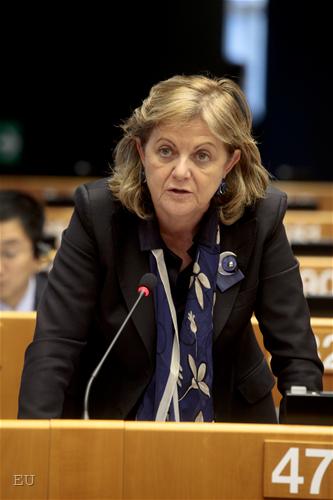 | © EU
| © EU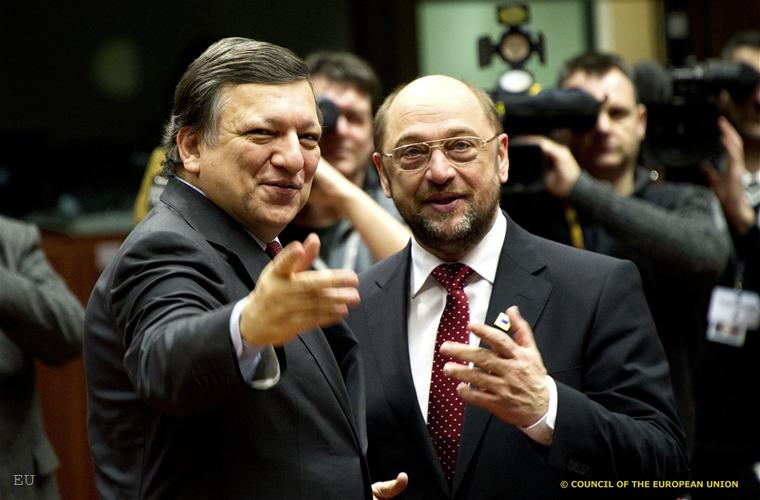 | © EU
| © EU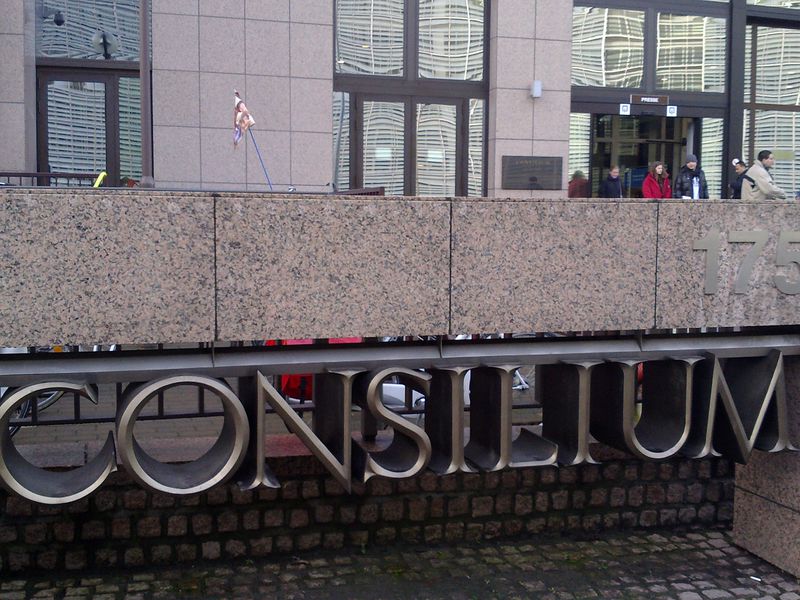 | © euinside
| © euinside